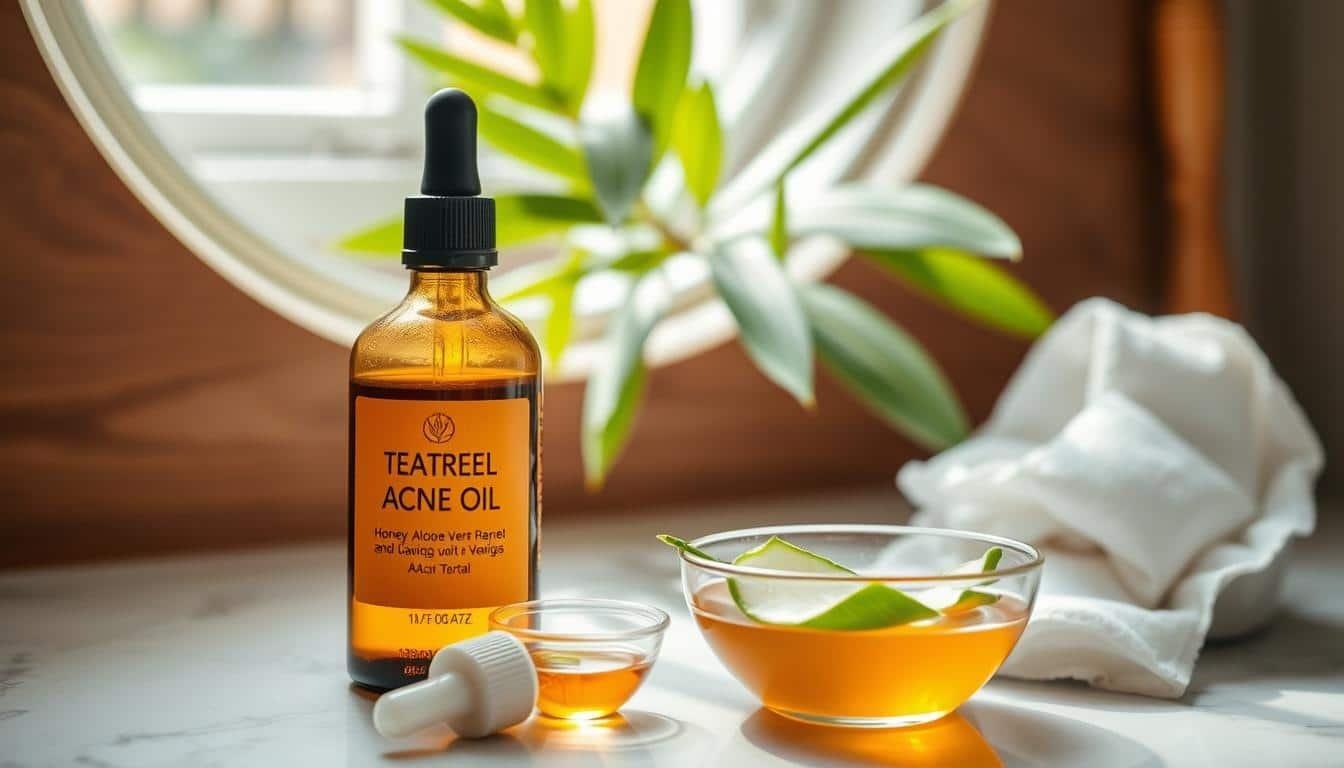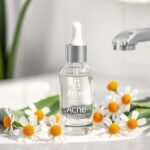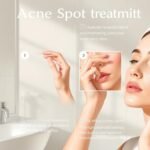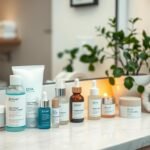Tea tree oil products can improve mild to moderate acne when applied twice daily. This natural remedy comes from the Australian tea tree. It has been used for centuries in traditional medicine.
Tea tree oil shows promise for acne-prone skin. It may help as a complementary treatment to your skincare routine.
Studies suggest tea tree oil’s potential in fighting acne. A 1990 study compared 5% tea tree oil to 5% benzoyl peroxide. Both showed impact, but tea tree oil caused fewer side effects1.
This natural remedy may have anti-inflammatory and antimicrobial properties. These qualities could help improve the appearance of acne.
Let’s explore how to use tea tree oil safely and effectively. We’ll look at its benefits for acne and the science behind it. You’ll learn how to add this natural remedy to your skincare routine.
Key Takeaways
- Tea tree oil shows potential as a natural treatment for mild to moderate acne due to its anti-inflammatory and antimicrobial properties.
- Limited research suggests that tea tree oil can reduce the number and severity of acne lesions.
- Proper dilution of tea tree oil is crucial to avoid skin irritation and adverse effects.
- Consistent application of tea tree oil products over several weeks may be necessary to see improvement in acne.
- While promising, tea tree oil should not be relied upon as the sole treatment for severe or persistent acne.
Stay tuned for top reviews on beauty supplies. We cover acrylic nails, nail polish remover, and hair color kits. You’ll also find info on hair growth serums and skincare routines.
We review moisturizers for dry skin and vegan beauty products. Don’t miss our takes on cruelty-free makeup and anti-aging creams. Find the best foundation for oily skin, makeup brushes, and beauty blenders too.
Understanding Tea Tree Oil and Its Acne-Fighting Properties
Tea tree oil is a natural solution for clear skin. It comes from the Melaleuca alternifolia plant and fights acne effectively. This essential oil can transform your skincare routine with its potent properties.
Tea tree oil works as an excellent tea tree oil spot treatment. It targets acne-causing bacteria and reduces breakouts. Let’s explore how it can help you achieve clearer skin.
What is Tea Tree Oil?
Tea tree oil comes from a woody shrub native to Australia2. It’s a thin, clear to yellow oil with a strong medicinal smell. Its unique composition gives it powerful antibacterial and anti-yeast properties.
This oil effectively fights acne-causing bacteria2. It can reduce acne lesions, oiliness, and pore size. Research shows promising results for tea tree oil in acne treatment.
Anti-Inflammatory and Antimicrobial Effects of Tea Tree Oil
Tea tree oil has strong anti-inflammatory properties. It soothes skin and helps with cystic acne, reducing bumps and hyperpigmentation. The oil also boosts white blood cell activity, aiding in healing2.
Its antimicrobial effects make it a powerful acne-fighting ingredient. Even a 5% concentration can effectively treat acne3. Using tea tree oil in moisturizers and cleansers helps combat stubborn pimples.
Many skincare products now include tea tree oil. You can find cleansers, moisturizers, and spot gels with this ingredient. Thursday Plantation offers affordable, pure tea tree oil products3.
Use tea tree oil cautiously and follow proper guidelines. Always patch test before use to avoid irritation2. Mix it with a carrier oil or moisturizer for safe application.
Spot-treat twice daily for effective acne treatment2. Be careful if you have sensitive or eczema-prone skin. Tea tree oil may cause irritation in some cases.
Check back often for reviews on beauty supplies. We cover acrylic nails, anti-aging creams, makeup brushes, and more. Find the best products for your skincare and beauty needs.
The Evidence: Studies on Tea Tree Oil’s Effectiveness for Acne

Scientific evidence supports tea tree oil’s effectiveness for acne treatment. Studies have investigated its potential benefits for managing acne symptoms. Let’s explore the findings of these studies.
2015 Review of Complementary Treatments for Acne
A 2015 review analyzed 35 studies on complementary acne treatments, including tea tree oil. It found some evidence supporting tea tree oil’s use for acne. However, the overall quality of evidence wasn’t optimal4.
This suggests more rigorous research is needed to fully understand tea tree oil’s effectiveness for acne. Further studies could provide clearer insights into its benefits.
2007 Study: 5% Tea Tree Oil vs. Placebo
A 2007 study compared 5% tea tree oil gel against a placebo for mild to moderate acne. The tea tree oil gel significantly improved acne severity compared to the placebo4.
This finding highlights tea tree oil’s potential as a natural acne treatment. It may be especially helpful for those with mild to moderate cases.
2017 Study: Twice Daily Application for 12 Weeks
A 2017 study examined twice-daily tea tree oil application for 12 weeks. Participants with mild to moderate acne saw significant improvements without serious side effects4.
While beneficial, tea tree oil may not be as potent as some prescription acne medications. It’s important to consider all options when treating acne.
Patience and consistency are key when using tea tree oil for acne. Acne scars can take weeks or months to fade. Overuse can lead to skin irritation4.
Always dilute tea tree oil before applying it to your skin. Perform a patch test to check for adverse reactions. This helps minimize the risk of side effects.
Popular tea tree oil products include Essential Oil Labs 100% Tea Tree Oil and The Body Shop Tea Tree Night Lotion. Keeva Tea Tree Oil Acne Treatment Cream is another option4.
Remember, everyone’s skin is unique. What works for one person may not work for another. Find the right tea tree oil solution for your skin type.
Check back often for reviews on beauty supplies. We cover anti-aging creams, moisturizers for dry skin, and foundations for oily skin. You’ll also find reviews on makeup brushes, hair growth serums, and cruelty-free makeup.
How to Use Tea Tree Oil Acne Treatment
Tea tree oil can be used as a cleanser and spot treatment for acne. It’s best to dilute it with a carrier oil or moisturizer. This natural remedy can effectively improve skin before seeking professional help.
Diluting Tea Tree Oil for Safe Application
Proper dilution is key for safe and effective use of tea tree oil. Mix 1-2 drops with 12 drops of carrier oil to avoid skin sensitivity. Popular carrier oils include coconut, jojoba, and sweet almond oil.
Diluting tea tree oil helps harness its acne-fighting properties while reducing potential irritation.
Patch Testing to Avoid Skin Irritation
Always do a patch test before applying diluted tea tree oil to your face. This helps prevent irritation or allergic reactions.
- Apply a small amount of diluted tea tree oil to the inside of your elbow.
- Wait 24 hours to see if any redness, itching, or irritation occurs.
- If no adverse reaction develops, you can safely apply the diluted tea tree oil to your face.
Tea tree oil can dry out skin, so keep it moisturized during use5.
Step-by-Step Guide to Applying Tea Tree Oil for Acne
After diluting and patch testing, follow these steps for your acne skincare routine:
- Cleanse your face with a gentle cleanser and pat it dry.
- Apply diluted tea tree oil to acne-prone areas using a cotton pad or fingertips.
- Gently massage the oil into your skin, focusing on breakouts or acne scars.
- Let the oil absorb for a few minutes before applying moisturizer.
- Repeat twice daily, morning and evening, for best results.
Studies show applying tea tree oil twice daily can improve mild acne5. A 2017 study found it significantly improved mild to moderate acne without serious side effects6.
Visit us for top beauty supply reviews, including acrylic nails, nail polish removers, and hair care products. We also cover skincare, makeup, and anti-aging products for all skin types.
Precautions and Potential Side Effects

Tea tree oil offers benefits for acne-prone skin. However, it’s vital to know its potential side effects. Some people may experience skin sensitivity or adverse reactions7.
Skin Irritation and Contact Dermatitis
Tea tree oil can cause skin irritation. This may include redness, itching, stinging, or dryness7. Always do a patch test before using it on larger areas.
If you notice any signs of irritation, stop using it right away. Consult a dermatologist if symptoms continue.
Toxicity if Ingested
Never swallow tea tree oil. It can be toxic when ingested. Serious side effects may include confusion and lack of muscle control7.
Keep tea tree oil away from children and pets. Don’t use it as an oral treatment.
Always dilute tea tree oil with a carrier oil before use. Start with a low concentration of 1-2%. Increase gradually if your skin tolerates it well.
If you have concerns about using tea tree oil, talk to a dermatologist. They can help decide if it’s right for you.
Check back often for the best reviews on beauty supplies. We cover acrylic nails, nail polish remover, hair color kits, and more. Find info on hair growth serums, skincare routines, and moisturizers for dry skin.
Discover the best vegan and cruelty-free makeup options. Learn about anti-aging creams, foundations for oily skin, makeup brushes, and beauty blenders.
Incorporating Tea Tree Oil into Your Acne Skincare Routine
Tea tree oil is a natural and effective acne treatment. It has anti-inflammatory and antibacterial properties that combat mild to moderate acne. When used correctly, it can also reduce acne scarring8.
Always dilute tea tree oil before applying it to your skin. Mix two drops with a teaspoon of carrier oil like coconut or almond. This prevents skin irritation and allergic reactions89.
Use diluted tea tree oil in spot treatments, face masks, or daily moisturizers. Applying it twice daily for 45 days can reduce acne severity. This includes fewer lesions and less skin inflammation810.
I’ve found that adding a few drops of diluted tea tree oil to my daily moisturizer has made a noticeable difference in managing my occasional breakouts and keeping my skin clear.
Tea tree oil works best when combined with other acne-fighting ingredients. These include benzoyl peroxide or salicylic acid. If using prescription acne treatments, consult your doctor before adding tea tree oil.
Always do a patch test before using tea tree oil. Stop using it if you experience irritation or discomfort. With proper use, tea tree oil can help manage breakouts.
Check back often for the best reviews on beauty supplies, including the best nail polish remover, best hair color kit, best moisturizer for dry skin, best anti-aging cream, best makeup brushes, and the best beauty blender.
Conclusion
Tea tree oil shows promise as a natural acne remedy. Its anti-inflammatory and antimicrobial properties come from terpinen-4-ol, its primary active component11. This oil effectively fights bacteria, fungi, and viruses, making it a popular acne treatment11.
Research suggests tea tree oil matches benzoyl peroxide in treating acne. It also has fewer side effects11. However, safe use is key. Dilute the oil and use a moisturizer to avoid skin dryness or irritation11.
Some people may have allergic reactions to tea tree oil. Patch testing and dilution can lower this risk11. If you don’t see results after weeks of use, talk to a dermatologist.
Scientists are studying tea tree oil’s antioxidant and antimicrobial properties for skincare12. More research will help us understand its full effects on acne. I’ll keep sharing my findings on beauty products.
Check back for reviews on vegan beauty items, anti-aging creams, and makeup brushes. Your journey to better skin care continues here.
FAQ
How do I dilute tea tree oil for safe application on my skin?
Can tea tree oil be used as a spot treatment for occasional blemishes?
What are the potential side effects of using tea tree oil on my skin?
How long does it take to see results from using tea tree oil for acne?
Can I use tea tree oil in combination with other acne treatments?
Source Links
- Could Tea Tree Oil Be the Acne-Fighting Ingredient of Your Dreams? – https://health.clevelandclinic.org/tea-tree-oil-for-acne
- Yes, Tea Tree Oil Can Help With Acne. But You Must Use It Correctly – https://www.womenshealthmag.com/beauty/a26000811/how-to-use-tea-tree-oil-for-acne/
- How to Use Tea Tree Oil for Acne: 12 Steps (with Pictures) – https://www.wikihow.com/Use-Tea-Tree-Oil-for-Acne
- Tea Tree Oil for Acne Scars: Evidence, Side Effects, and More – https://www.healthline.com/health/beauty-skin-care/tea-tree-oil-for-acne-scars
- A guide to tea tree oil and using it for acne spots – Stratum Clinics – https://www.stratumclinics.com/a-guide-to-tea-tree-oil-and-using-it-for-acne-spots/
- Can Tea Tree Oil Help Get Rid of Acne? – https://www.healthline.com/health/skin/tea-tree-oil-for-acne
- Tea tree oil – https://www.mayoclinic.org/drugs-supplements-tea-tree-oil/art-20364246
- How to Dilute Tea Tree Oil for Acne (Everything You Need to Know) – https://www.exposedskincare.com/blogs/blog/how-to-dilute-tea-tree-oil-for-acne
- Unlock Clear Skin: Using Tea Tree Oil for Acne – https://www.danishskincare.com/tea-tree-oil-acne-guide/?srsltid=AfmBOorT0KERwBkQekkB2ce_vsF3VLDT7qk6ORf2pxIkG0uzBE9ETO3D
- Tea Tree Oil – Dr Davin Lim – https://drdavinlim.com/a-z-skin-care/tea-tree-oil/
- Unlock Clear Skin: Using Tea Tree Oil for Acne – https://www.danishskincare.com/tea-tree-oil-acne-guide/?srsltid=AfmBOor-SkhEYjF0c_WfBWNZhWmWmqKxCcokk2BG9DpXXRDBHZYgh99x
- Tea Tree Oil: Properties and the Therapeutic Approach to Acne—A Review – https://www.ncbi.nlm.nih.gov/pmc/articles/PMC10295805/








Interesting read, but isnt it high time we explore less hyped natural remedies? Havent we overused tea tree oil for acne already?
Interesting read, but arent we overlooking the potential for tea tree oil allergies? Cant ignore that risk. Thoughts?
Im just thinking, wouldnt slathering oil on acne-prone skin just worsen the situation? Isnt that counterproductive? Just a thought.
I still think that diet and hygiene play a bigger role in acne than any oil. Tea tree or not, just saying!
Diet and hygiene are important, but dont underestimate the power of natural oils. Just saying!
Honestly, if tea tree oil is so magical for acne, why isnt everyone with acne using it? Big Pharma conspiracy maybe?
Tea Tree Oil for acne, really? Why not just stick with good old soap and water? Works for me, no pimples here. #SimplicityIsKey
Interesting article but arent we overlooking the potential skin irritation caused by undiluted tea tree oil? Lets consider all sides, folks!
Skin irritation is user error, not tea tree oils fault. Dilute it, problem solved!
Has anyone considered the environmental impact of large-scale tea tree oil production? Question everything, even natural remedies! #SustainabilityFirst
Interesting read, but isnt it high time we stop demonizing acne and start accepting it as a part of natural skin health?
Interesting read, but isnt it true that tea tree oil can be overly drying for some skin types? Lets balance the info here.
Interesting read, but why not just use over-the-counter acne products? Arent they faster and more reliable than tea tree oil? Just a thought.
Ever consider the harmful chemicals in OTC products? Natural remedies can be safer and gentler.
Interesting article, but isnt tea tree oil too harsh for some peoples skin? What about those with sensitive skin types?
Interesting article, but what if my skin is too sensitive for Tea Tree Oil? Any natural alternatives? Tea isnt my cup of tea, ha!
Interesting read, but anyone else think its bizarre that were putting tree oil on our faces and not questioning it?
Oils from nature, your face is natural. Whats really bizarre is smearing chemicals on our skin!
Interesting read, but arent there any side effects of using tea tree oil? Everythings got a downside, right? Just food for thought. 🤷♂️
Everythings got a downside, including ignorance. Ever heard of Google? Use it, mate! 🙄
Interesting read, but isnt it peculiar how weve always had tea tree oil but just now discovered its acne-fighting abilities? Just a thought.
Interesting read, but ever wondered if the natural treatment hype is just a marketing gimmick? Are we just overpaying for plant juice? 🤔💸🍃
Interesting read, but anyone else think that tea tree oil smells way too strong to be putting it on your face?
Interesting read, but isnt it odd how were quick to trust natural treatments without long-term studies on their effects? Just food for thought!
Just wondering, has anyone considered the sustainability aspect of mass tea tree oil production? Is it harmful to the environment? Thoughts?
Interesting read but isnt Tea Tree Oil too harsh for sensitive skin? What about potential allergic reactions? Seems a bit risky for acne treatment.